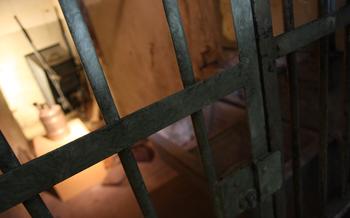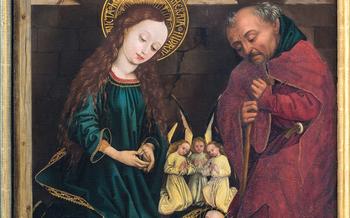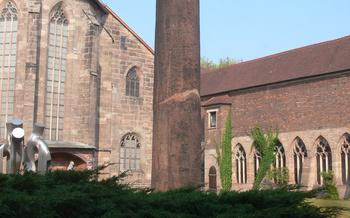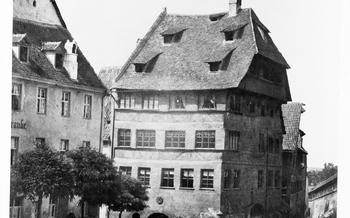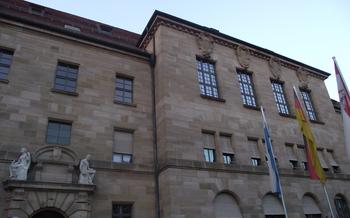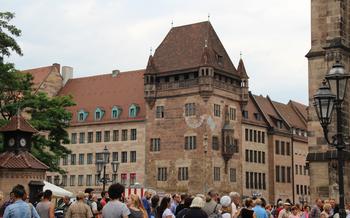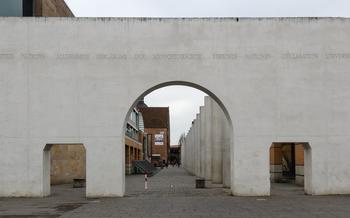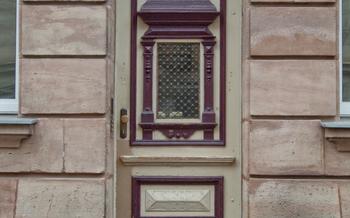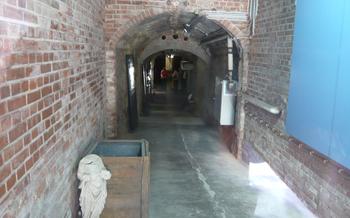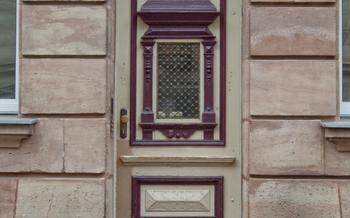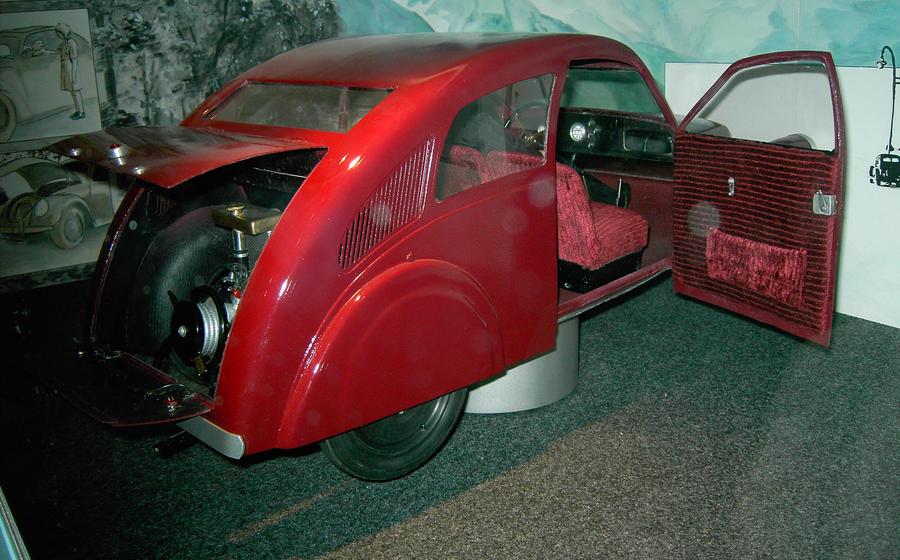
Museum for Industrial Culture (Museum Industriekultur)
- History of the Museum for Industrial Culture
- Location and Accessibility
- Exhibitions and Displays
- Interactive Experiences
- Guided Tours and Workshops
- Special Events and Programs
- Educational Resources
- Research Facilities
- Accessibility for Visitors with Disabilities
- Museum Shop and Café
- Sustainability Initiatives
- Community Involvement
- Visitor Reviews and Feedback
- Tips for Visiting
- Insider Tip: Discover the Secret Underground Tunnels
History of the Museum for Industrial Culture
The Museum for Industrial Culture in Nuremberg, Germany, stands as a testament to the city's rich industrial heritage. Founded in 1989, the museum occupies a former factory complex, blending historical charm with modern exhibition spaces. It showcases the industrial development of Nuremberg and the surrounding region, from its early beginnings to the present day.
The museum's exhibits highlight the innovations and achievements of local industries, including machinery, electronics, and toy manufacturing. Visitors can trace the evolution of industrial processes and technologies, gaining insights into the region's economic and social history. The museum's mission is to preserve and promote industrial culture, honoring the contributions of generations of workers and entrepreneurs who shaped Nuremberg's industrial landscape. It also plays a vital role in revitalizing the former industrial area, transforming it into a vibrant cultural hub.
Location and Accessibility
The Museum for Industrial Culture is conveniently situated at Äußere Sulzbacher Str. 62 in Nuremberg, Germany. It is easily accessible via public transportation, with several bus and tram lines stopping nearby. The closest stop is "Museum Industriekultur," which is served by bus lines 36 and 90, as well as tram line For those arriving by car, there is ample parking available in the vicinity of the museum.
The museum is located in the heart of Nuremberg's former industrial district, which has undergone a remarkable transformation in recent years. The once-bustling factories and warehouses have been repurposed into a vibrant mix of cultural institutions, creative spaces, and residential areas. This dynamic environment provides a fitting backdrop for the Museum for Industrial Culture, which serves as a testament to the city's rich industrial heritage.
Exhibitions and Displays
The Museum for Industrial Culture houses a diverse array of exhibitions and displays that delve into the rich industrial history of Nuremberg and the surrounding region. These exhibits showcase a wide range of topics, including machinery, transportation, and manufacturing processes. Visitors can explore the development of the city's renowned toy industry, learn about the region's contributions to the automotive sector, and gain insights into the evolution of various manufacturing techniques. Among the notable artifacts on display are a replica of the first German steam locomotive, a collection of vintage printing presses, and a variety of interactive exhibits that allow visitors to experience industrial processes firsthand. The museum's exhibitions provide a comprehensive overview of the region's industrial heritage, offering visitors a deeper understanding of the factors that shaped Nuremberg's transformation into a major industrial center.
Interactive Experiences
The Museum for Industrial Culture offers a range of interactive exhibits and activities that enhance the visitor experience and bring the history of industry to life. Visitors can engage with hands-on displays, operate replica machinery, and participate in workshops that demonstrate traditional industrial processes.
One of the highlights of the museum is the interactive exhibition "From Ore to Steel." Here, visitors can follow the journey of iron ore as it is transformed into steel. They can operate a miniature blast furnace, pour molten metal into molds, and learn about the different stages of steel production.
Another popular interactive exhibit is the "Printing Workshop." Visitors can learn about the history of printing and try their hand at setting type and printing on a traditional letterpress. The museum also offers workshops on bookbinding and papermaking, providing visitors with a hands-on experience of these traditional crafts.
These interactive elements not only make the museum more engaging for visitors but also provide a deeper understanding of the industrial processes that shaped Nuremberg and the surrounding region.
Guided Tours and Workshops
The Museum for Industrial Culture offers a range of guided tours that delve deeper into the history and significance of the exhibits. These tours are led by knowledgeable guides who provide expert insights and anecdotes, enhancing the visitor experience. Specialized tours for specific groups, such as students, families, or history enthusiasts, are also available upon request.
In addition to guided tours, the museum hosts a variety of workshops, lectures, and educational programs throughout the year. These workshops provide hands-on experiences and opportunities to learn more about industrial processes and technologies. For example, visitors can participate in workshops on traditional printing techniques, metalworking, or textile production. These programs are designed to engage visitors of all ages and encourage them to explore the world of industrial heritage.
To book a guided tour or workshop, visitors can contact the museum directly or reserve online. Advance booking is recommended to ensure availability, especially for popular tours and events.
Special Events and Programs
Throughout the year, the Museum for Industrial Culture hosts a variety of special events, festivals, and programs that bring the museum's collection and industrial heritage to life. These events offer visitors a unique opportunity to engage with the museum in new and exciting ways.
Some of the most popular events include the annual Industrial Heritage Festival, which celebrates the region's rich industrial legacy with live demonstrations, workshops, and exhibitions. The museum also hosts regular themed events and workshops, such as photography workshops, lectures by experts in industrial history, and hands-on activities for families.
For those interested in delving deeper into the museum's collection, guided tours led by experts in industrial history are offered on a regular basis. These tours provide visitors with a unique insight into the museum's artifacts and their significance to the development of industry in Nuremberg and the surrounding region.
To stay up-to-date on upcoming events and programs, visitors can check the museum's website or social media pages. Advance booking is recommended for popular events and workshops to avoid disappointment.
Educational Resources
The Museum for Industrial Culture is committed to promoting industrial education and offers a range of educational resources for visitors of all ages. The museum's educational programs are designed to engage students with the history, science, and technology of industry. School groups and educators can book guided tours, workshops, and interactive activities that align with their curriculum. The museum also offers a variety of educational materials, including lesson plans, worksheets, and multimedia resources, which can be accessed online or in person. These resources help teachers bring the excitement of industrial history into the classroom and inspire students to pursue careers in science, technology, engineering, and mathematics.
Research Facilities
The Museum for Industrial Culture is a treasure trove for scholars and researchers interested in industrial history and innovation. The museum houses an extensive research library, which contains a vast collection of books, journals, and archival materials on various aspects of industrial development. The library is open to the public and provides access to a wealth of information on the history of industry, technology, and business.
In addition to the library, the museum also offers a range of research facilities, including a state-of-the-art digital archive and a research laboratory. The digital archive contains a vast collection of digitized documents, photographs, and audio-visual materials related to industrial history. The research laboratory, on the other hand, is equipped with cutting-edge technology for conducting research on industrial materials and processes.
Scholars and researchers can access the museum's research facilities by appointment. The museum staff is dedicated to supporting research and innovation and can provide guidance and assistance to researchers throughout their projects. The museum also offers a variety of educational programs and workshops for researchers, including seminars, lectures, and workshops on various topics related to industrial history.
Accessibility for Visitors with Disabilities
The Museum for Industrial Culture is committed to providing an inclusive and accessible environment for all visitors, regardless of their abilities. The museum features various accessibility features to ensure that visitors with disabilities can enjoy a comfortable and enriching experience. Ramps and elevators are available throughout the museum, making all exhibits and facilities accessible to wheelchair users. Additionally, the museum offers audio guides and visual aids for visitors with hearing or visual impairments. Trained staff members are always ready to assist visitors with disabilities, providing information and guidance to enhance their museum experience. The museum also hosts regular workshops and events designed specifically for visitors with disabilities, creating a welcoming and inclusive atmosphere for all.
Museum Shop and Café
Enhancing the museum experience is the well-stocked museum shop, a treasure trove of unique souvenirs, industrial-themed gifts, and books that delve deeper into the history and significance of the exhibits. From intricate replicas of machinery to stylish accessories inspired by the industrial revolution, the shop offers a diverse range of mementos for visitors to cherish.
Complementing the shopping experience is the inviting museum café, a cozy haven where visitors can relax and refuel. The menu features a delectable array of local specialties and refreshments, ensuring that every palate is catered to. Whether indulging in a hearty lunch or savoring a sweet treat, visitors can soak in the museum's ambiance while enjoying a delightful culinary journey.
Sustainability Initiatives
The Museum for Industrial Culture takes sustainability and environmental responsibility seriously, aligning with its mission to promote industrial heritage in a sustainable manner. The museum has implemented various initiatives to minimize its ecological footprint and contribute to a more sustainable future.
One notable initiative is the museum's commitment to energy efficiency. The museum building has undergone renovations to improve insulation and reduce energy consumption. Additionally, the museum utilizes renewable energy sources, such as solar panels, to generate electricity and reduce its reliance on fossil fuels.
The museum also focuses on sustainable waste management practices. It has adopted a comprehensive recycling and composting program, diverting a significant portion of its waste from landfills. The museum encourages visitors to participate in these efforts by providing recycling bins throughout the facility.
In keeping with its mission to preserve industrial heritage, the museum seeks to promote sustainable manufacturing practices. It collaborates with local industries to showcase sustainable technologies and innovations, demonstrating how industrial development can coexist with environmental responsibility.
Through these initiatives, the Museum for Industrial Culture sets an example for other museums and cultural institutions, demonstrating that sustainability can be an integral part of preserving and promoting industrial heritage.
Community Involvement
The Museum for Industrial Culture actively engages with the local community through various outreach initiatives and partnerships. It collaborates with schools and educational institutions to offer educational programs, workshops, and guided tours tailored to students of all ages. The museum also partners with local businesses, organizations, and cultural institutions to host events, exhibitions, and community gatherings. These collaborations contribute to the museum's mission of preserving and promoting industrial heritage while fostering cultural exchange and community engagement.
One notable initiative is the museum's partnership with the Nuremberg Chamber of Commerce and Industry. Together, they organize the annual "Industry Days" event, which brings together businesses, experts, and the public to discuss current trends and challenges in the industrial sector. The event features panel discussions, workshops, and networking opportunities, providing a platform for knowledge sharing and collaboration.
The museum also hosts regular community events, such as lectures, film screenings, and concerts, that explore the history, impact, and future of industrial culture. These events provide a space for dialogue, learning, and community building, fostering a sense of connection among visitors and the museum.
Through its outreach efforts and community partnerships, the Museum for Industrial Culture plays a vital role in preserving and promoting industrial heritage while contributing to the cultural and educational landscape of Nuremberg.
Visitor Reviews and Feedback
The Museum for Industrial Culture receives overwhelmingly positive reviews and feedback from visitors. Many praise the museum's unique and informative exhibits, interactive displays, and knowledgeable staff. Visitors appreciate the opportunity to learn about the region's industrial heritage and gain insights into the technological advancements that shaped Nuremberg. Here are some excerpts from visitor reviews:
"A fascinating museum that brings the industrial history of Nuremberg to life. The interactive exhibits are particularly engaging and help visitors of all ages understand the impact of industrialization on the city." - Tripadvisor
"Highly recommended! The museum offers a comprehensive overview of the city's industrial development, from its early roots to modern manufacturing. The exhibits are well-curated and the staff is friendly and helpful." - Google Reviews
"I was particularly impressed by the museum's commitment to preserving and promoting industrial culture. The exhibits showcase the ingenuity and creativity of the people who built Nuremberg's industrial heritage." - Facebook
Overall, visitors commend the Museum for Industrial Culture for its engaging exhibits, educational value, and commitment to preserving industrial heritage. It is a must-visit for anyone interested in history, technology, or the industrial development of Nuremberg.
Tips for Visiting
To make the most of your visit, plan your trip carefully. The museum is open from Tuesday to Sunday, from 10 am to 5 pm. Admission fees vary, so check the museum's website for current pricing and any discounts or promotions. To avoid crowds, consider visiting on a weekday or during the off-season.
Start your visit with the orientation film in the museum's cinema to get an overview of the history and significance of the industrial heritage of Nuremberg. Don't miss the highlights of the museum, including the historic steam engine, the printing press, and the textile machinery.
If you have time, take a guided tour to gain deeper insights into the exhibits. Tours are available in German and English and can be booked in advance. The museum also offers educational programs and workshops for schools, families, and groups.
To enhance your visit, consider dining at the museum's café, which offers a range of local specialties and refreshments. The museum shop is also worth exploring, where you can find a variety of souvenirs, books, and industrial-themed gifts.
Insider Tip: Discover the Secret Underground Tunnels
Did you know that beneath the Museum for Industrial Culture lies a network of hidden underground tunnels? These tunnels were once used to transport coal and other materials to nearby factories. Today, they have been transformed into a unique exhibition space, offering visitors a glimpse into Nuremberg's industrial past.
To explore the tunnels, join a guided tour led by a knowledgeable museum guide. As you descend into the depths of the museum, you'll learn about the history of the tunnels and their role in the city's industrial development. You'll see remnants of the original coal-mining equipment and experience the eerie atmosphere of these subterranean passageways.
The underground tunnels are a hidden gem that most visitors to the Museum for Industrial Culture miss. Don't miss this opportunity to explore this unique and fascinating part of the museum. Remember to book your guided tour in advance to secure your spot.
